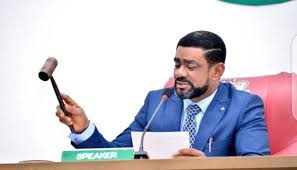Soludo empowers “1 Million Anambra Digital Tribe” on Tech skills
By Funmilayo Adeyemi
Anambra State Governor, Charles Soludo, has unveiled the “1 Million Anambra Digital Tribe” (1MADT), an initiative designed to empower no fewer than one million “Ndi Anambra” – Anambra people, with world-class digital skills.
This is an initiative through the Solution Innovation District (SID), toward transforming Anambra into Africa’s Silicon Valley and a Smart Mega City.
This is contained in a statement made on Wednesday by Ms Chinwe Okoli, Special Adviser to the Governor on Innovation and Business Incubation.
According to Okoli, the ground-breaking programme aims to democratise access to digital education by providing free, high-quality digital skills training to over one million Ndi Anambra, both residents and indigenes.
” At the heart of the initiative is the SID Academy – a robust Learning Management System (LMS) accessible via www.sidacademy.ng, where participants can learn anytime, anywhere, at their own pace.
“Designed to be inclusive and transformative, 1MADT offers 32 beginner to advanced courses in high-demand digital fields such as artificial intelligence, cloud computing, SEO optimisation, web design, data analysis, graphic design, digital marketing, and more.
“It is with flexible training durations ranging from four to 12 weeks.
“No prior experience or qualifications are required, making it accessible to everyone- from students and job seekers to professionals and entrepreneurs,” she said.
She added that the benefits of this initiative extend far beyond individual learners, but equipping Anambra’s workforce with future-ready skills.
Okoli also said that the 1MADT had been designed to drive job creation, inspire innovation, fuel entrepreneurship, enhance SME productivity, and position the state as a magnet for global technology investments.
“Mr Governor promised to upskill 10,000 persons annually but has already surpassed that number.
“With a new target of one million, the goal is to eradicate digital illiteracy and unlock the potential of our people to compete favourably with technology.
“Mr Governor is developing 13.7 hectares as our Silicon Valley and investing in the skill sets required to compete globally. This programme is for all Ndi Anambra—and it is totally free to beneficiaries.
“There are even additional incentives such as laptops and smartphones to celebrate excellence,” she said.
She added that the initiative supported the Governor’s broader vision of economic transformation through digital empowerment and innovation-driven development.
“In line with this vision, SID is also deploying SID Mini Hubs/partner centres which are tech-enabled learning centres strategically located in schools and communities across the state.
“These hubs are outfitted with computers, internet access, projectors, and teleconferencing tools to ensure equitable access to digital resources, especially in underserved areas. (NAN)
Edited by Vivian Ihechu














